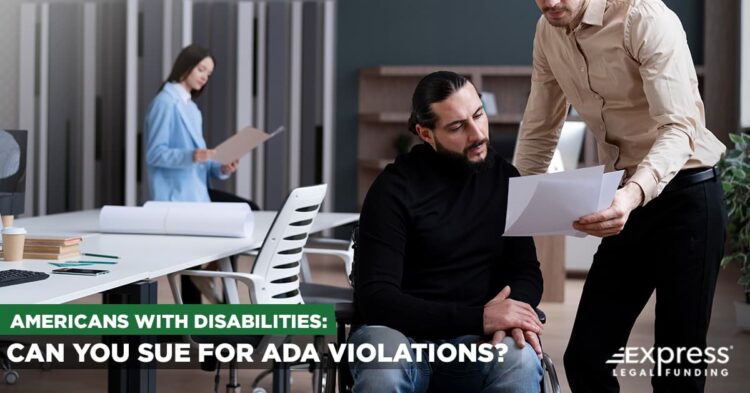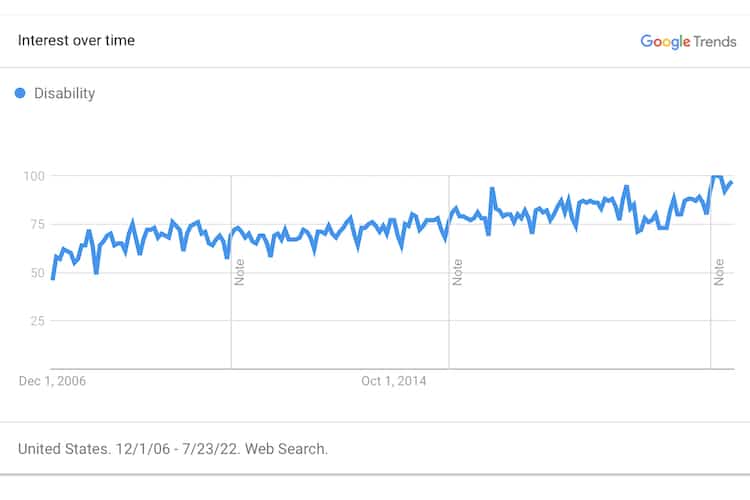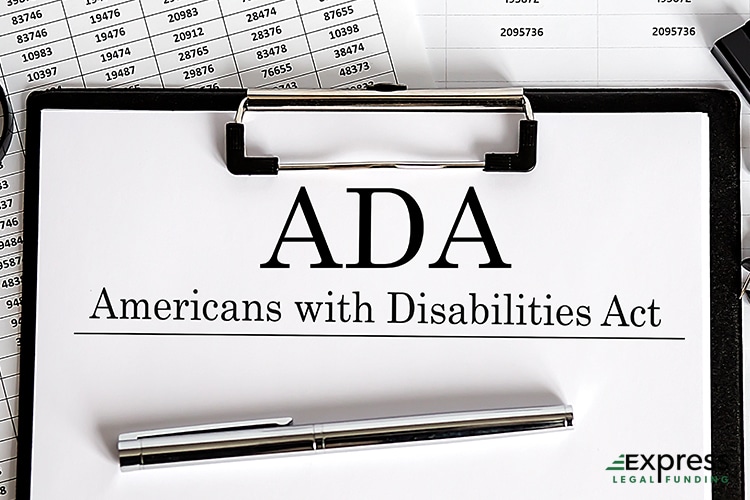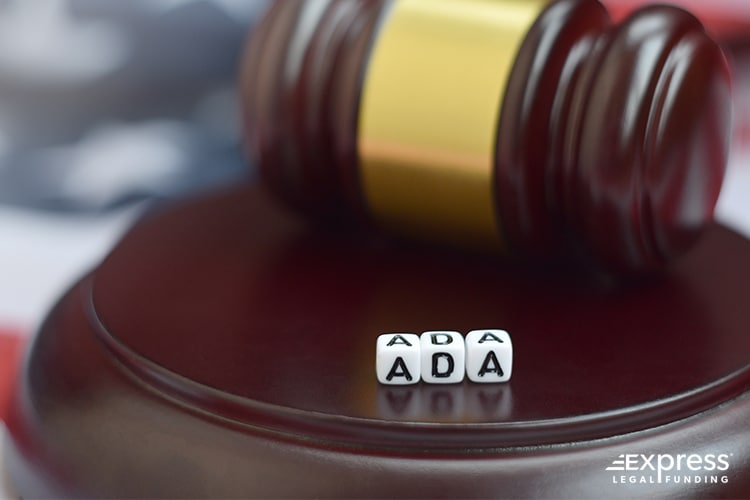
The 21st Century has brought a lot of change and acceptance. One area that has seen significant progress but is too often overlooked is the rights of disabled Americans.
The United States, its laws, and its people have become more accommodating to people with disabilities. This acceptance goes past being aware and mindful of others.
It addresses the realization that someone who uses a wheelchair to move from place to place will not be able to climb the same staircase as someone who can walk or run up a flight of stairs without a second thought. (Still, this example only describes a challenge representative of a small fraction of people with disabilities.)
Wheelchair users rely on wheelchair ramps to enter and exit buildings and elevators to change the building floors of high rise buildings.
Although these types of reasonable accommodations have become standard for disabled American citizens over time, they are not everywhere when needed.
Some property owners and customer-facing services lack providing even the most essential accessibility resources their customers need to access their business.

The U.S. government realized accessibility problems and lack of accommodations was an issue over thirty years ago and did something positive to address it: the ADA. President George HW Bush passed the Americans with Disabilities Act(ADA) in 1990, soon after taking the oval office.
The ADA legally addresses this issue for people with disabilities.
The Americans with Disabilities Act has made significant progress in the years since, as the required accommodations for people with disabilities have become standardized and the focal point of the ADA, that’s an accommodation act seeking to ensure equal access to public locales for Americans with disabilities.
Unfortunately, no law is perfect, and realistically the goal should be to create the least imperfect set of statutes and to enforce them as best as possible.
So whether through indifference to or ignorance of the law, some businesses have yet to adapt to these accommodations and ensure ADA compliance.
These can make it impossible for people with disabilities to access their building or to safely move and stand on the premises.
Fortunately, if a facility lacks the required disability accommodations that you need, there are ways for you to seek legal justice. This article will explain how ADA violations work and show some common examples of ADA lawsuits.
You Have Legal Rights Covered By the ADA
The good news in this situation, if this applies to you or a loved one, is that the ADA has become a strong law that the U.S. Department of Justice(DOJ) has allowed to get stronger and help you successfully sue in more areas.
So by a person or company engaging in ADA violations, they are not only putting their clients with disabilities in compromising situations that can make them feel unjustly ashamed, but they are also acting illegally.
With this said, you have legal rights under the Americans with Disabilities Act and the right to sue.
The lack of required public accommodations can make people with disabilities feel marginalized and discriminated against, especially when the result is exclusion from the general public due to their disability.
Sixty-one million Americans suffer from disabilities, which makes it all the more understandable to be upset over not gaining admittance or even being asked to leave a restaurant or shop due to your or your family member’s disability.
The pain caused by a business owner asking a parent to leave a store because of their child’s disability can be all the more gut-wrenching. So let’s dive in further and discuss what the ADA is.
What is ADA?
If you, like most people, are not overly familiar with the ADA, you will find it challenging to determine what legal actions you can take when someone violates the ADA.
So a good place to start is learning what the ADA is and how it came to be. The American Disabilities Act (ADA) is a civil rights law that prohibits inequality and discrimination against people with disabilities.
The ADA is similar to the Civil Rights Act of 1964, which made it illegal for businesses to discriminate based on a person’s race, religion, sex, or national origin.
After years of lobbying and activists like Ed Roberts speaking to congress, the ADA was signed into law on July 26th, 1990.
The National Council on Disability drafted the bill’s first version, as they recommended the law’s enactment starting in 1986.
The ADA includes both physical and mental disabilities. The level of severity for a disability to qualify is low. The disability can be temporary and does not need to be life-altering.
However, not all medical disabilities are covered under the ADA. Disorders that commonly lead to illegal and anti-social behavior are not protected for fear of abusing the civil rights law. For example, Kleptomania.

These regulations are designed to protect Americans from discrimination based on disabilities. This includes associates of people with disabilities.
For example, a spouse or parent of a disabled person would also be afforded protection under the ADA. These protections also extend to how public facilities are laid out to ensure all Americans have equal access.
Currently, the ADA provides five major provisions known as titles to protect disabled individuals from discriminatory practices.
These five provisions apply to different parts of society that an average American, disabled or otherwise, would interact in their day-to-day activities. These provisions are:
Summary of ADA Titles 1-5
- Title I: Title I provisions of the ADA prohibit employment discrimination based on a person’s disability. Certain employers have to follow specific requirements not to discriminate against a potential or current employee based on their disability. This means an employer is limited when it can make decisions based on an employee’s disability. Although, there are exceptions.For example, it does not expect an employer to devote significant financial resources to hire an employee with a disability in order so that person can safely do that job with their disabilities. The last important concept to note is that Title I does not apply to all employers.The ADA uses the term “covered entities,” which includes employers with 15 or more employees, labor organizations, and job agencies.So a store with only a few employees and the owner is not subject to Title I of the ADA. Still, that does not mean small businesses get a pass on other forms of discrimination.
- Title II: Title II of the ADA is about the requirements to make public buildings and transportation accessible for Americans with disabilities. The buildings in Title II are government-run buildings. Title II is specific to state and local government programs and buildings.The requirements are enforced regardless of whether the public program or facility accepts federal aid. Most of the ADA requirements for public building accommodations are focused on physical disabilities; therefore, construction is a crucial factor.The list is long. It includes everything from accessible water fountains and wheelchair ramps to special leniency for historical buildings. Some examples of public buildings covered in Title II include:
- City halls
- Public school districts
- Community colleges
- Public libraries
- Title III: Title III in the ADA is a continuation of Title II provisions as it focuses on public places and commercial locations, which are publicly open businesses.It includes laws outlining and defining these organizations and the exact accommodations required to not discriminate against Americans with disabilities.Title III further stipulates the same resources Title II provides but on a broader scale than the latter. Title III protects Americans who have a disability from being unable to get the goods and services they need due to a public place not accommodating their disability.
- Title IV: Title IV provisions within the ADA focus on telecommunications services providing accommodations for customers with visual or auditory disabilities.Title IV led to specialized technology being implemented into carrier and phone services, allowing deaf and hard-of-hearing citizens to use their phone services just as effectively as a citizen with perfect hearing and speech ability. The FCC is the government agency that enforces Title IV of the ADA.
- Title V: Title V provisions under the ADA are the laws and technicalities that did not fit under the other four titles. It also protects disabled Americans from being coerced and from retaliation by any industries affected by the ADA.One crucial provision is that it allows for attorney’s fees to be reimbursed at the end of a case. This makes lawsuits a more practical option for victims of ADA discrimination.
The protections afforded by the ADA are in place to ensure that disabled Americans are not discriminated against for their disabilities and can access the same venues, jobs, and services as those who are not suffering from a disability.
However, some places are exempt from the ADA as the owners are already allowed to restrict who has access.
Private Entities Are Exempt From ADA
- Private property such as someone’s home or backyard
- Private organizations such as religious organizations or clubs
Generally, large public institutions must adhere to ADA regulations. However, the fact these protections are mandated on a federal level does not mean every company follows them properly.
Some companies fail to make the proper ADA accommodations, whether it be for ignorance or avoidance of expense. That is why the ADA was passed into law as legal requirements and not just recommended guidelines.
By a company or school violating the ADA, they bring harm to disabled American citizens.
Whether the problem caused is big or small, violations of the ADA are violations of federal law. Federal over state and local law makes it extra serious. With that said, you might wonder what you can legally do when these violations occur.
Can You Sue Over ADA Violations?
Yes, you can sue for violations of the ADA. Although not in every case, you might think. There are entities excluded from ADA requirements. However, most public and commercial organizations fall under the ADA.
So when a company or facility does not adhere to the ADA’s guidelines, it potentially exposes itself to a lawsuit for its actions or just as problematic inactions.
The ADA makes these disregards and violations a legal offense, and the specific laws allow you to hold the offending company or institution liable in a court of law.
So at the end of the day, among the many things you can file a lawsuit for ADA violations are ones that can be very strong cases in court.
It is well within the rights of disabled American citizens to hire an ADA rights attorney and law firm to pursue a lawsuit against parties allegedly in violation of the ADA.
While filing a suit against a big company in a lawsuit might seem daunting, ADA discrimination lawsuits are more common and successful than you may realize.

That said, some restrictions exist on who can be sued under the ADA’s regulations. This primarily means that only areas and facilities intended to be open to the public can be sued for ADA violations.
The laws are written this way because public institutions must remain available for any individual in the general public, including not discriminating against a person based on their disability.
Conversely, a private institution or residence is exempt from following the ADA and its requirements.
The private property owner is allowed to restrict access to whomever they choose. (Private property owners can still be legally required to give authorities access under certain conditions, like when complying with a search warrant.)
While you might not be able to sue your neighbor for failing to accommodate your disability, any public facility is fair game.
Public facilities are expected to provide disability accommodations and render services the same way they would for an individual who is not disabled. A few examples of facilities expected to adhere to ADA regulations include:
Covered Entities Subject to ADA Compliance:
- Restaurants
- Movie Theaters
- Factories
- Hospitals
- Hotels
- Educational Campuses
- Stores
- Stadiums
Several other facilities are expected to follow ADA regulations, but the above are more likely to see through traffic.
Failure to adhere to these regulations opens that facility up to a potential lawsuit from the individual they failed to accommodate.
The penalties awarded in lawsuits for these violations can range drastically, so it’s wise to be aware of the regulations in place so you can spot them when they are being ignored.
What Are the Most Common ADA Violations?
The most common violations that allow you to pursue a lawsuit over ADA regulations include:
Common ADA Violations Examples:
- You can sue a building for failing to incorporate handicap-accessible architecture, which includes wheelchair ramps that would allow an individual to access the building.
- You can file a lawsuit for a company failing to incorporate handrails on staircases or in walkways. Some disabled individuals, especially the elderly, require these handrails for safety. The handrails help them maintain their balance and traverse the area without fear of personal injury.
- You can sue a building owner for failing to incorporate specific facilities for disabled patrons. This regulation accounts for accessible restrooms, parking spaces, and parking lots that allow citizens to park near the facility’s entrance and gain entrance without straining themselves.
- You can sue a company or school for failure to provide communication alternatives to citizens with auditory or visual disabilities. This regulation can include failing to provide written or ASL alternatives for deaf or hard-of-hearing citizens and failing to provide spoken or braille alternatives for blind or hard-of-sight citizens to help them communicate with their impairments.
- You can sue a business or company for additional expenses being charged based on disabilities, such as charging a citizen with a wheelchair more for a taxi than a fully ambulatory citizen.
- Entities can be sued for failure to maintain any of the above accommodations to ensure they remain in working order for those who need them.
- You can sue a company or business for wrongly terminating you as an employee due to your disability.
- You can sue a business or store for turning away a customer or refusing to serve them due to their disability.
- You can file a lawsuit against your state or local government covered under Title II for inaccessible web content. For example, if the government website does not have alt-text for its images, which is used by screen reader software.
- You can file a suit against a company covered under Title III for inaccessible web content to people with disabilities. ADA compliance can apply to company websites in addition to brick-and-motor store locations.
These violations of ADA regulations are the basis for ADA discrimination lawsuits and are recognized nationwide.
While the ADA cannot assist you in finding representation for your case, it does ensure you retain the right to hold public facilities accountable for discriminatory practices.
Even though anti-discrimination legislation of the ADA has helped these accessibility issues become less common, compliance violations have continued as some companies look for ways to justify the lack of disability resources they provide their workers and customers.
As recently as this year, we’ve seen many ADA lawsuits against businesses regarding these violations.
However, most lawsuits have ended in favor of disabled citizens and forced these companies to adjust their accommodations.
If you are interested in a more in-depth analysis of these cases, allow us to indulge your curiosity.
Examples of ADA Lawsuits
Despite the federal implementation of ADA regulations, modern violations have resulted in lawsuits. These lawsuits were designed to correct the defendant’s actions and ensure that they are ADA compliant from that point forward.
However, the lawsuits occasionally include settlements for the individual on the receiving end of the disability discrimination.
While these modern violations should never have occurred, new cases this year show a lack of concern for disabled individuals by certain public facilities.

U.S. v. Uber Technologies
One of the more recent ADA violations came from the well-known transportation company Uber. The case U.S. v. Uber Technologies, Inc. was an attempt by Uber to dismiss a complaint where excess fees were levied against passengers with disabilities.
The extra charge was a time fee due to disabled individuals taking more than 2 minutes to board the vehicle as opposed to individuals without disabilities.
Uber’s argument focused on the fact that they were a private transportation company not beholden to Title III of the ADA.
Despite Uber’s arguments, the United States argued to preserve the Title III regulations on Uber’s services. The argument alleged that Uber remains subject to Title III and cannot add additional charges exclusive to disabled customers as a transportation company akin to taxi or bus services.
This case began on November 10th, 2021, and reached a settlement on July 18th, 2022.
With public opinion not being in favor of the rideshare company, Uber agreed to a $2.2 million settlement in the federal lawsuit for the additional wait time fee.
$1.7 million of the settlement money was divided among 1,559 Uber passengers. U.S. Attorney Stephanie M. Hinds made a statement saying,
Ensuring equal access to transportation for those with disabilities is an important goal of the ADA.
EOCC v. Creative Networks, LLC
A much earlier example from the EEOC (Equal Employment Opportunity Commission) is an ADA claim filed in federal court on September 28th, 2009.
It involved a job applicant with a hearing disability who applied for a position at Creative Networks, LLC. The person who applied was rejected because they could not complete the pre-employment training as the company failed to provide an interpreter.
Ironically, the company exists to provide services for disabled citizens and failed to accommodate the plaintiff’s request for an interpreter for her disability.
Just under three years later, on September 20th, 2012, the judge ruled in favor of the plaintiff as Creative Networks failed to provide an interpreter in compliance with ADA regulations costing the plaintiff their employment opportunity with their offices.
After the company was found liable, the case proceeded to award monetary damages and provide injunctive relief.
Despite the Creative Networks case being a 13-year-old example, it remains relevant to future victims of ADA violations and discrimination.
A company failing to accommodate a disabled citizen denies them the opportunities and resources they have a right to seek employment in the U.S. today.
Examples of successful lawsuits against companies in violation of the Americans with Disabilities Act show disabled persons can take legal action against discriminatory practices and better cement their place in society and the workforce.
Money Damages: Americans With Disabilities Act Lawsuits
There is no excuse for a company or a general public area to disregard ADA regulations and actively discriminate against disabled Americans.
While it is upsetting and disappointing that such abuses continue to exist in 2023, you retain the right to sue and the power to seek legal action against the offending party.
Unfortunately, ADA violations remain an issue in some isolated areas and require correction.

These lawsuits help to resolve the discrimination you might have faced but also offer a more significant benefit to the whole of society.
When a company is successfully held accountable for discrimination, it better prevents them and other companies from repeating the same ADA violations and mistakes in the future.
However, suing anyone takes time and can be a cost-intensive endeavor. Being in an ADA lawsuit can put you at a financial disadvantage, especially concerning your employment.
Not getting hired or being terminated based on your disability can leave you in a financially dire situation as the cost of your daily life activities goes on.
Fortunately, Express Legal Funding is there to help with our pre-settlement funding services.
We understand how the cost of living has increased significantly and that having an ADA discrimination lawsuit can make that more of a challenge to struggle with.
This is a situation where we can help you financially while your attorney litigates against the defendant on your behalf.
That’s because the two main qualifiers to apply are that you have hired an attorney on a contingency fee basis and that the defendant you are suing in the ADA lawsuit has money to pay you for the wrong they caused you.
In most states, the money is advanced as legal funding, which is a non-recourse finance agreement–not a loan of any type.
That means we can provide you with a sum of cash in hand now in exchange for a portion of the case proceeds you recover at the end of your claim.
Not being a loan allows for the best part: You only need to ensure repayment(via your attorney) to us from your recovery against the defendant you are suing in the case.
So if you and your ADA discrimination lawyer give it your all and go to court but lose, you get to keep the lawsuit cash advance money we advanced to you. Risk-Free. So at the end of the day, you can start your financial recovery win or lose with Express Legal Funding.
Give us a call or contact us online anytime to learn more about our pre-settlement funding and to see how it can be the best financial option available to you during a lawsuit.

